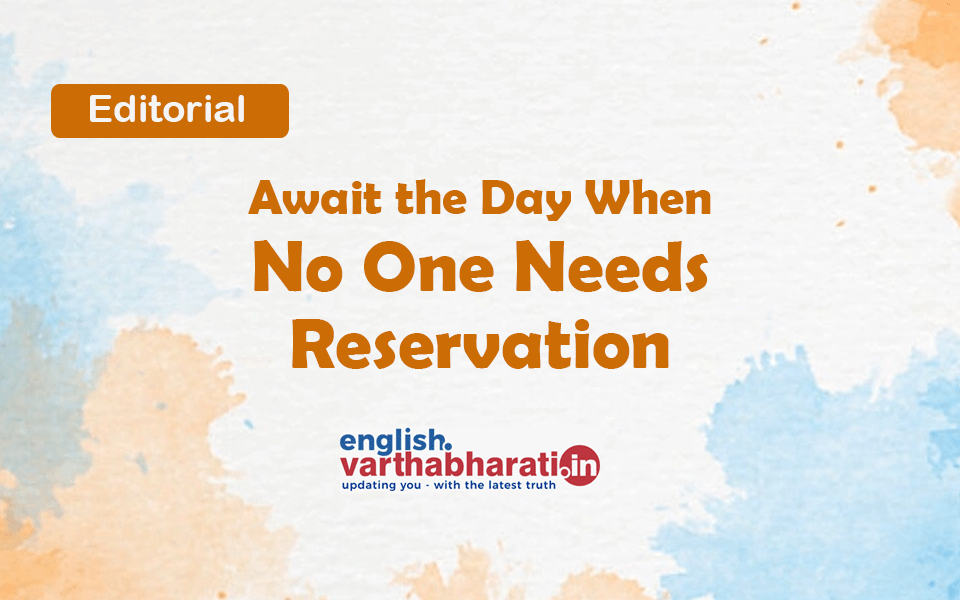The Supreme Court has asked: “For how many more generations will reservations in jobs and education sectors continue?” This question has arisen in the context of providing reservation for Marathas. The court has expressed anguish over the arguments that the maximum limit for reservation should be removed. In Maharashtra, Marathas are not ‘ex-untouchables’ and have obtained preferential representation in religious, political, economic and other sectors. Despite this, they have been demanding reservation using people, wealth, and political might.
Undoubtedly, this demand, if conceded, is going to directly hit the economically weaker sections of Dalit and Backward Classes. When upper castes including Marathas demand reservation, the first question that the court should ask: ‘Are you experiencing caste exploitation or untouchability in society’? or ‘Have you been inadequately represented in political and education spheres due to caste exploitation or untouchability’? These two questions prove that they would not be eligible for reservations. But no judge or constitutional expert ever asks such a question to upper and forward castes. Not only this, the communities eligible for reservation remained silent and gave their permission when ten per cent reservation was provided for the poor in the upper castes. Of late, many upper castes are demanding reservation. Even though these advanced communities do not require reservation, certain forces are instigating them to fight for reservation. The stark reality is that this is an RSS ploy to remove reservation and these agitations are not being taken up with any concern for the respective castes or communities.
The question ‘How long will reservation continue’ was not raised by the Judge but he was made to ask such a question. By providing ten per cent reservation for the upper caste poor, the objective of reservation has already been defeated. Reservation has not met any of its objectives so far or the powerful upper caste lobby in the establishment have not allowed its effective implementation. To this date, lower caste people are involved in manual scavenging. A handful of Dalits benefited out of reservation, got educated, and obtained the best jobs. These educated Dalits have hardly tried to uplift their brethren or implement reservation for them. Many of them maintained a distance from the same Dalit community they were part of the moment they experienced the life of upper classes. The situation would not have become so grim if those who saw better life thanks to reservation had taken interest in other Dalits. As Dalit movements weakened, strong communities started asking for their share in reservation. This reached a stage with upper caste poor given ten per cent reservation. If developed communities start grabbing a share of reservation, the reservation provided to weaker sections will shrink. If the concept of reservation tried to empower the disempowered weaker sections, the country is seeing a trend where the powerful and empowered sections are demanding more benefits. Society has accepted all this silently. When various castes hit the street to demand fresh or more reservation, the discussion that ensues is that ‘nobody needs reservation.’ It is obvious that a big conspiracy is being hatched to make sure that reservation is eventually removed by projecting that reservation is the reason for all confusion in the society.
The first question that the court has to ask is: “Does caste-based exploitation exist”? If an answer is found to this question, an answer can be found to the question of whether reservation should continue or not. Even to this day, this country has Dalit colonies and Dalits are being exploited inhumanly. A situation is created where Dalits riding a horse at their weddings are attacked. It is not that the Judges are not aware of this. Let the judiciary obtain a report about the extent to which the lives of Dalits have improved after reservation. And if their lives have not been improved, it should probe as to why there has been no improvement. Then the truth will emerge. Today, the responsibility should be to make sure that reservation is implemented effectively and not to do away with reservation on the pretext that ‘the period of reservation is over.’ If Patels, Jats, or other castes exert pressure for reservation, the extent of representation that these castes have obtained when compared to other castes should be examined. Based on this, a decision on whether reservation should be provided or not should be taken. The only answer to the question ‘For how many generations reservation should continue’ is ‘Reservation should continue through generations as long as caste exploitation continues. When those who face caste exploitation get maximum representation in politics, industries, education spheres, then reservation can be removed.’ Let’s wait for such a day!
Let the Truth be known. If you read VB and like VB, please be a VB Supporter and Help us deliver the Truth to one and all.
Kalaburagi: Four men have been arrested in Kalaburagi on charge of hacking a man with lethal weapons and pelting stones at him under the limits of Station Bazaar Police Station recently.
According to police sources, Anand Jalak Shinde (34), Ashitosh Jalak Shinde (30), Imran Mehboob Sheikh (28) and Sohaib Anwar Qureshi have been arrested. The men are accused of the brutal murder of Syed Mehboob, a resident of Station Bazaar Upper Line Hamalawadi in the city.
An FIR was filed by the Station Bazaar Police Station based on a complaint given by Syed Ismail, father of the deceased Syed Mehboob.
Following quick probe, the police team successfully arrested the suspects within 24 hours. The arrested men were produced in court and have been sent to judicial custody.
The City Police Commissionerate has appreciated in an official release the police team’s quick solving of the murder case and arrest of the four men accused of murdering Syed Mehboob.





